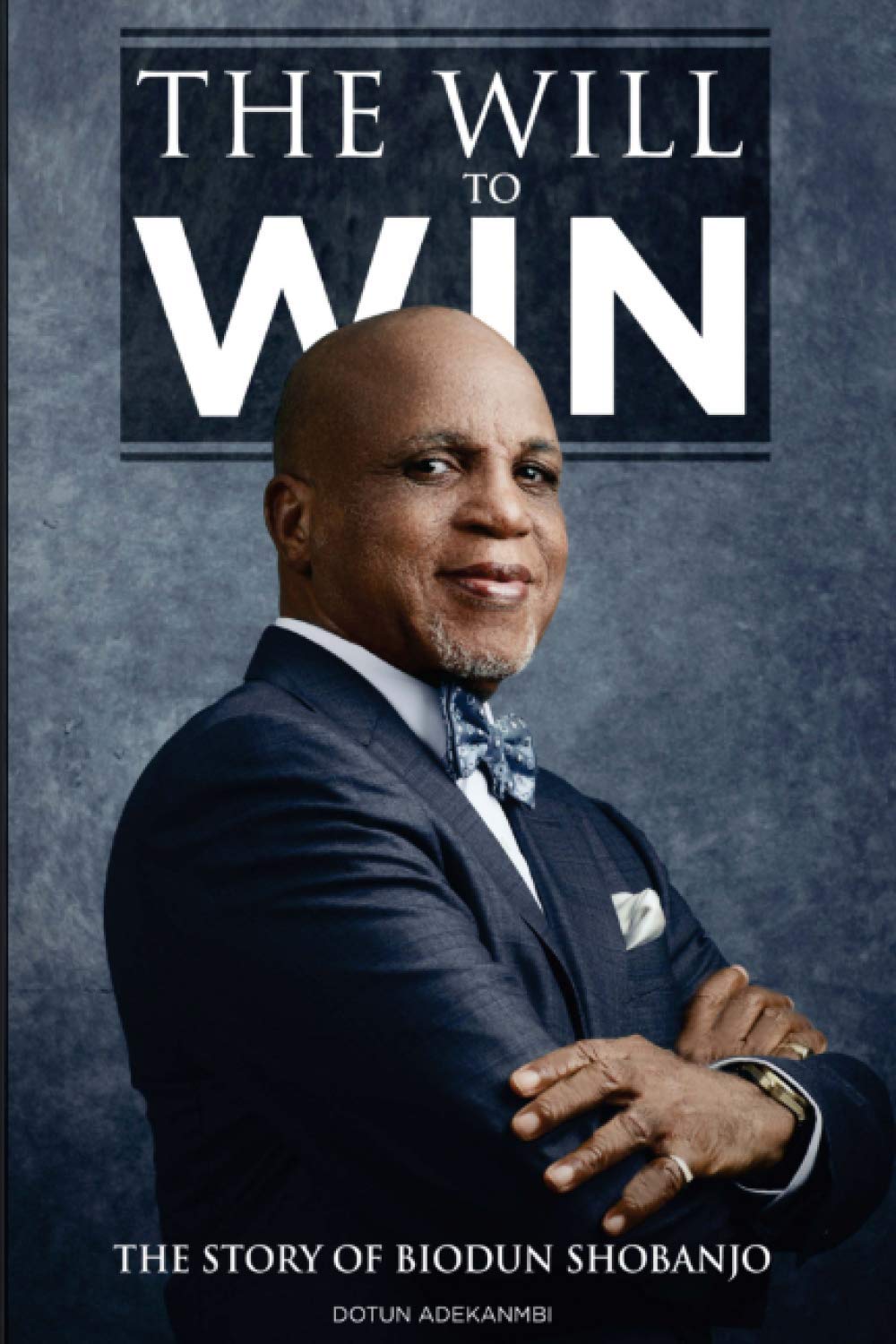It is good for the stories of people to be told. It is even better for their histories to be written. The very act speaks volume, whether the character writes his/her history or engages a master of the craft to do the honours. When people who other people want to read about choose to write about the stretch of their life’s journey, a province of it, or about the centrality of their actions in a historical event, they are giving back in a manner that is so often underappreciated. The reality is much worse around here. And yet, the very idea of a biography/memoirs is often warped in a sense.
For some, it is a self-adulatory treatise of how they did it best. For some others, it is some form of image-laundering effort for yesterday’s man, or some personage the society has moved past. ‘The Will to Win: The Story of Biodun Shobanjo’ is not one of them. It is the story of a man who, having lost his father at 15, and without the benefit of a university education, had to find the courage to take on life on his own terms. As many would find out, it is an eclectic mix of determination and disappointments, risks and rewards, awe and anger. It is a humbling, yet daring trace of a man (and his work) whose achievements most admire, whose personality many love to hate, and whose methods some utterly detest. It is the story of the ‘main issue’ as far as advertising in Nigeria is concerned, but more easily the history of someone who has built the equivalence of a business empire in any clime.
The writer, Dotun Adekanmbi, begins the story of the man from the end – that boardroom, in front of journalists, where he signalled the end of his 25-year run as Chief Executive Officer of a company he had dared to leave a promising career to found. That steely will, which is a recurring theme, is the kernel of his work. Without it, there would not have been a need for this book. It is the main story. The writer, however, begins the history of Abiodun Olusina Shobanjo from the very beginning. In 14 chapters (and 535 pages), the details of his ‘growing-up’ both in life and business are finely presented.
In Coming of Age (Chapter One), we are taken to the character’s (Shobanjo’s) very beginning – his parents, his birth and upbringing, unique education in different parts of the country and the many lessons he picked along the way. An early experience would teach him that in his dealings, “the first rule is to trust people and give them a chance to be true to their word. Or to betray it.” The chapter is a sketch of some of the events and experiences that shaped him in the early years.
We all need ‘a place to stand’ (Chapter Two). And Shobanjo was greeted early by this reality when life seemingly dealt him a bad hand with the death of his father, leaving him with his mother and four siblings to care for. His determination to take life on instead of griping was his place to stand. The writer shares the details of Shobanjo’s two stints in the civil service and the reasons for his detour into broadcasting, then public relations and finally, advertising. In Chapter 3 (The Glamour Merchants), we are taken through Shobanjo’s early years in advertising, his discipline and investment in his professional stuff, his meteoric rise to the top of the professional ladder, personal joys and professional disappointments, as well as the watershed moment when he resigned his appointment to chart a new course – founding a company (later, a business empire) what is still being celebrated for, today.
Chapter 4 (Grant: Sorry, I’ve Got to Go) is the story of Shobanjo’s sticking to his guts – his decision to resign his appointment in the face of several entreaties made to prevent his exit. Chapter 5 (Have you Considered Working Anywhere Else?) is the story of Insight Communications’ very beginning – the name – simply, how the recourse to the ‘inner eyes’ can set the spark of the beginning of a truly phenomenal venture. For the first time, we get to meet the dream team and the fine details of the heavy lifting to get Insight running when it entered the market on Wednesday, January 2, 1980, in the midst of financial storms and tussle for turf with a familiar foe. In good detail, we learn of the modest marks of Insight to achieve its corporate targets and industry-wide obligations. The chapter also captures the company’s baptism in the murky waters of political electioneering.
In the next chapter (Chapter 6: Insight: Firing on All Cylinders), we follow the trajectory of Insight’s decent wins, major campaigns that made Insight in the early years as well as the birth stories of the businesses that make up, today, what is known as the Troyka Group. Since the journey wasn’t all smooth, we see the moves to cut professional losses and stop business haemorrhage. In Chapter 7 (Haemorrhage), we see the mix of personal travails and triumphs both at home and at work. Much more portrayed than in any other chapter, we get to know what Shobanjo is like when he’s not Chairman – his relationship with the 5 people who have the unique opportunity of calling him dad. Chapter 8 (The AAPN Presidency) switches back to work and narrates the intrigues and controversies that characterised his election and tenure as President of the Association of Advertising Agencies of Nigeria (AAAN). In Chapters 9 (Entering the New Millenium) and 10 (You’ll Need People with Strong Hearts), we get to know Shobanjo’s views with respect to the issue of succession planning. We also learn, amongst other things, about Shobanjo’s leadership inclinations and his belief that “leadership is best attained and enjoyed when an individual is fully prepared to seamlessly assume a dream position, not when it is thrust on him by circumstances.” The chapter really dives into Shobanjo’s ‘style.’
In Chapter 11 (The Morning After), we see the organisational alignments that trailed Shobanjo’s assumption as Chairman and his many engagements as a ‘retiree’, including his feature on the headline entrepreneurship reality TV show – ‘The Apprentice Africa’.
The latter part of Chapter 12 (The Quest for Immortality) captures the essence of the inspirations and negotiations that culminated in the record-breaking equity partnership between Troyka and Publicis Groupe. Many have been privileged to have passed through the Troyka Management Trainee Programme – the group’s initiative at laying a solid ground for the hands-on training of young, brilliant and driven individuals who would shape the tomorrow of marketing communications in Nigeria. The first part of Chapter 12 shares the story. While Chapter 13 (Now That Tomorrow’s Here) is a demonstration of his faith in the ‘tomorrow’ – the young people who have been prepared and gifted with the unique opportunity of leading companies within the group. The last chapter (All Said…) is a climax of some sort – a tribute done by an array of distinguished personalities to whom Shobanjo, at one point or in their career, has been either a partner, a boss, an associate or a friend. It is a depiction of Shobanjo by those who have had the unique opportunity of interacting with him the closest.
The end section of the book is a unique addition. The epilogue presents Shobanjo’s involvement in some events of historic note in the advertising industry, his contributions to, and recognition by the Ivory Tower. There is also a section dedicated to giving an understanding of his work rules, his position on key issues, and the list of accolades in the personal and corporate hall of fame. Lastly, the book offers a window into Shobanjo’s views on the current state and future of advertising and advertising practice in Nigeria. The details would be relevant to professionals in the marketing communications space.
In all, the book says as much as it does not say. But this is not unusual with books of this nature. Nonetheless, some important details are left out. For example, it would have been nice to get a sense of the nitty-gritty of the frustrations and lessons from doing and growing a business within the realities of Nigeria’s unique socio-political milieu.
‘The Will to Win: The Story of Biodun Shobanjo’ makes for a good read, and the lessons bear some significant import for young people who hope to chart a different course and not be held back by dogmas and conventions. Students of advertising, and professionals will, especially, find it a useful resource material. A big lesson is: not many will dare to repeat the successes of Biodun Shobanjo. The few who will, no doubt can find some inspiration in Shobanjo’s story. His is truly a journey characterised by the will to win.






Comment
No comments found.